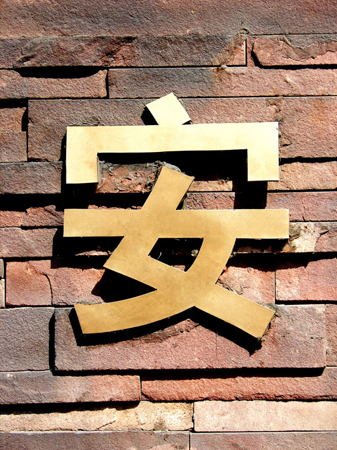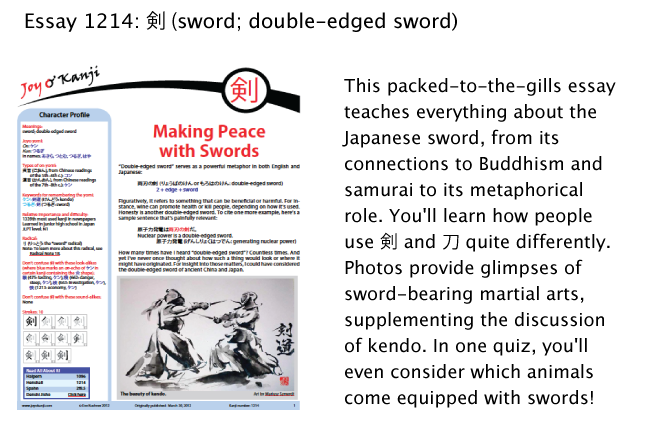Dream State
The March newsletter just came out, and as I have announced there, four people won the contest I offered in the February newsletter. Huge congratulations to Kelly Godsoe, Tilak Bhattacharjee, Junko Soda, and Patrick Sneyd, who received three essays apiece! (I like that the four winners come from different countries. Kanji brings the whole world together!)
In the same newsletter, I have provided contest answers (and a new contest!), but one answer calls for extra discussion. Here's the question again:
1. illegitimate (throne) + year = _______
a. election year
b. leap year
c. year of worldwide uprisings
d. year in which a controversial person accedes to the throne
If you want to think about it for a moment, I'll block the answer with an image that I recently added to the next-to-last section of the FAQ:

Now for the answer:
1.b. illegitimate (throne) + year = leap year, written in kanji as 閏年 (うるうどし).
Why would the non-Joyo 閏 mean "illegitimate (throne)," and what in the world does that have to do with leap year?!
According to the dictionary Kanjigen, 閏 has the following meanings:
1. irregular
2. remainder
3. illegitimate (emperor)
Although I think of a throne and emperor as very different entities, the last definition extends to "illegitimate (throne)."
On leap day in ancient China, the emperor would lock himself in his castle and neglect his job, which temporarily made him an “illegitimate" emperor. The character 閏 therefore depicts an emperor (王) inside a gate (門)! Because a leap year is irregular (as opposed to a normal year) and has an extra day (a remainder of sorts), 閏 also came to mean “irregular" and "remainder.”
In this sense, 正 (41: right, normal, legitimate) and 閏 are antonyms. They join forces in 正閏 (せいじゅん), which means “regular year and leap year” or “legitimate and illegitimate (emperors).”
As long as we're focusing on ancient times, I need to tell you about something related to ancient Greece. This morning I dreamed of a striped centaur. From the waist up, he was a naked, bearded man with light-brown curls. On the bottom, he was all zebra. I spotted him turning in circles in the strangely shallow waters under the Golden Gate Bridge, as if he were a whirlpool. Mesmerized, I approached and asked if I could take his photo. Yes, he said, but only for a price; striped centaurs apparently do nothing for free, and he was fed up with the unwanted attention he always received. (He turned out to be a colossal jerk who felt victimized in every way.)
Later in the dream, I wondered where I should store the photos in my computer—under human or zebra? I felt I needed to pick one. And it occurred to me, even in the dream, that I was really asking myself what his radical was, as if he were a kanji that divided into top and bottom. After all, the main function of a radical is to tell you how to classify a kanji.
No wonder I dreamed of radicals. Right before bed, I had been working with this photo of 安 (223: peaceful; inexpensive), which will appear one day in Radical Note 40 on the "roof" radical:

I used to dream of kanji all the time, back when I needed to draw them for classes and when I wrote Crazy for Kanji. In those dreams I would puzzle over the correct formation of a character, and when I awoke I would immediately look it up to see how close I'd been. (Usually a bit off but within respectable range.) I don't dream of kanji as often now, so the radical centaur was a most welcome visitor!
A few nights ago I remembered those old kanji dreams when I saw Jiro Dreams of Sushi. True to its title, this documentary has a part where famed sushi chef Jiro Ono says, "I would see ideas in dreams. I would see grand visions of sushi."
Incidentally, the kanji for the given name Jiro is 次郎 (じろう), meaning "second-born son." (I'll soon write the 郎 essay, so I just reviewed my notes on that today, trying to see what lies ahead. Out popped 次郎! Great timing!)
His surname, Ono, is 小野 (おの), which means "small field," but appropriately enough it sounds like a fish to me! After all, ono is a Hawaiian fish, otherwise known as a wahoo. (What a name!)
The sushi movie was quite good, but that was almost beside the point for me. I reveled in the bounty of phenomenal kanji shots. They were as vivid as the dead and dying fish we saw in frame after frame, but so much more attractive! I felt as fulfilled as if I had just visited Tokyo and had seen a bounty of kanji in all directions.
Early in the movie I spotted a sign for 北斗 (ほくと), which is an abbreviation for 北斗七星 (ほくとしちせい: the Big Dipper). I think the sign was for a restaurant; it wasn't pointing the way to the actual constellation! I wrote all about 北斗七星 in essay 1633 on 斗 (dipper), due out on April 13, so I was thrilled to catch sight of the sign and to know just what it meant. This time last year, 北斗 would have been lost on me. How sweet it is to make progress!
One more thing about the movie: In the English subtitles, several sentences included shokunin, as if the word needed no translation. I knew it corresponded to 職人, but I was quite puzzled. I thought 職人 simply meant "employee" and carried no lofty nuances. However, the chefs at Ono's restaurant spoke of their long apprenticeships and their heartbreaking efforts to meet their boss's exacting standards. One chef made a large omelette about two hundred times, having to throw each one out because Ono said it wasn't up to snuff. Finally the day came when he deemed the eggy concoction good enough, and the tapped-out subordinate was so happy that he cried. At moments such as those, the workers would say that they had finally become worthy of the title 職人. In that context, says my proofreader, 職人 means "artisan," not just "employee." As I've recently finished writing the essay on 匠 (1388: artisan), I wondered about the difference. He explained that although one can call oneself a 職人, one should never label oneself a 匠 (たくみ), which has the nuance of "master." Even so, Ono's employees tend to work for years before daring to call themselves even 職人!
Today's JOK Notebook entry has been a complete stream of consciousness, which is perhaps appropriate for a discussion of dreams, striped centaurs, and kings who become shut-ins on leap day. However, at some point I should touch base with reality! For that reason, I want to let you know that I've posted essay 1214 on 剣 (sword; double-edged sword):

Writing this essay was an enormous endeavor, as there's an endless amount to say about Japanese swords. Moreover, weapons make me uncomfortable, and I needed to confront that directly. As days turned into weeks and I still found myself wrestling with this one essay, I sometimes felt as tapped out as the omelette-making chef! But I found the same happy ending to my story as he did; I managed to make peace with both swords and the sword essay, and kendo enthusiasts seem very excited about the result.
Hmm. I have a feeling that my next dream will involve a stressed-out sushi chef (or a stressed-out writer) wielding a 剣!
Happy dreams, and happy weekend! Oh, and do try your hand at the contest in the March newsletter!

Comments